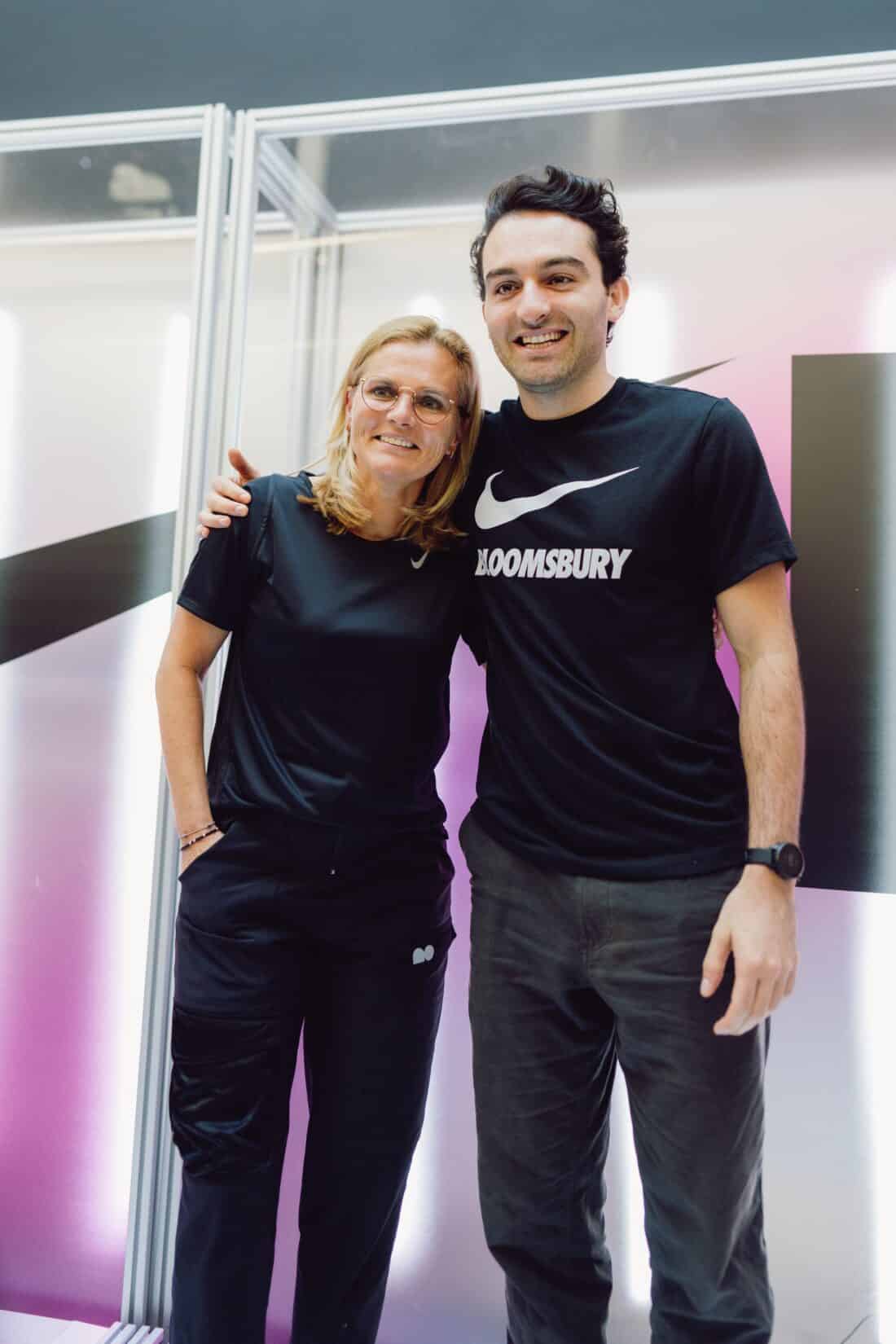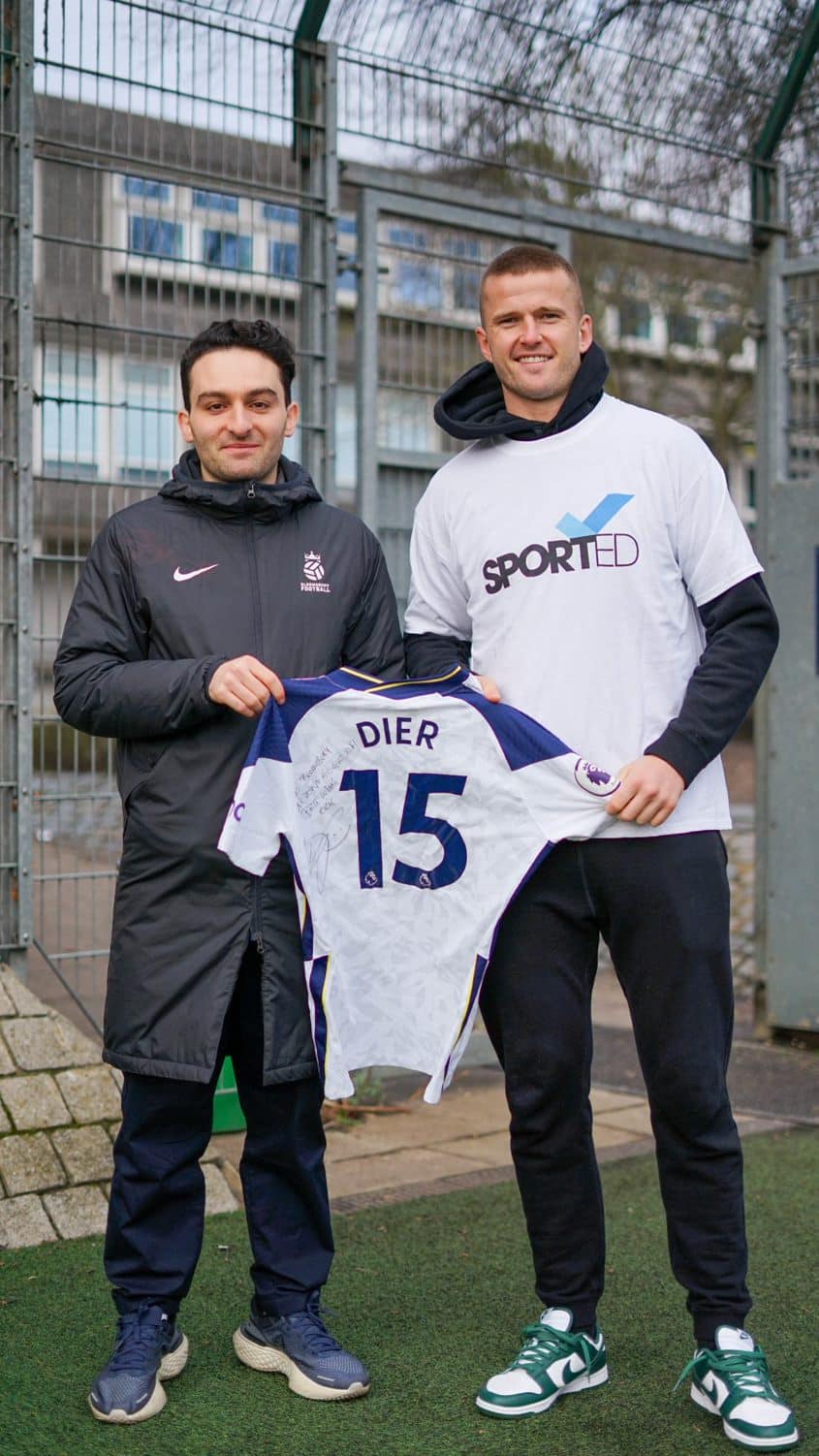FOR SEPTEMBER’S STORIES FROM THE SIDELINES, WE’RE TALKING CHARITY. TO KICK THIS OFF, CHARLIE TOLD US HIS TOP 10 LEARNINGS AS CO-FOUNDER AND CEO OF BLOOMSBURY FOOTBALL.
1. RELATIONSHIPS ARE AT THE HEART OF EVERYTHING
Don’t underestimate the power of relationships when creating and building a social impact organisation. It’s so important to invest time into creating relationships with people who support are able to support you – whether that’s with advice, time, or funding. And then to invest energy into maintaining these relationships- showing how grateful you are, taking these people on the journey with you.
Building these relationships comes down to understanding your story and vision and being able to effectively communicate this. It’s not just a pitch – it’s being able to communicate how much you care about what you’re doing, involving partners in the journey of the charity and creating that emotional connection.
The time I spend building and maintaining relationships is not wasted- it’s at the heart of what we do. Without the support of our partners and community, we couldn’t keep changing the game for young people in London. It’s as simple as that.
2. FIND THE RIGHT PEOPLE
Having really good people on your team makes a massive difference.
I’ve learned that one person that is really invested in what we do and believes in the vision is more effective than three people who just come into work every day and don’t feel that connection to the organisation and our mission.
My focus has always been on finding the right people and investing in them- giving them opportunities to develop, making them feel valued, inspiring them.
3. STRATEGY IS WHAT YOU SAY NO TO
I’ve had to learn that there is a difference between being led by impact and being led by funding. It’s so important to stay true to what you think is right, and your purpose.
It can be easy to get side-tracked by people offering you other projects or types of funding that are not quite aimed at what you do, but you could do because it’s there and available. A good example at Bloomsbury is when we get asked by schools to provide multi-sport training sessions. We have to say no, because football is what we do. That’s not going to change, even though expanding this may offer different opportunities in the short term.
It’s about being clear with your boundaries- not saying yes to everything and being prepared to say no to opportunities that don’t fit into our mission or what we believe. It’s learning to be patient, trust yourself and wait for the right opportunities.

4. IT’S OK TO NOT KNOW
Accepting that you don’t know most things and being forced to do things you don’t know anything about is tough.
When leading other people, you feel like you need to know everything and be able to answer every question, but actually it’s ok to say that you don’t know and to go and find the answer. You don’t need to feel nervous being put into a situation where you don’t know – people will be fine with that, you don’t need to pretend. Just stay curious and be really keen to learn.
Something that has been so important for me is learning how to ask questions and ask for advice. Most people are happy to give advice if you ask them, so don’t be shy to ask an expert for some time to chat to them.
5. GO FORTH & NETWORK
You don’t go into anything with a network if you haven’t worked in the space before. When I started Bloomsbury, I didn’t have a network in football or charity. You have to go out there and start meeting people- go to events, don’t be afraid to talk to people. The worst thing that they can do is be a bit rude and not really engage, that’s fine, that’s happened to me loads of times before.
6. THE POWER OF CONVERSATION
Being a founder can be stressful. In many situations, you are the end point in terms of responsibility. The worst times have been moments when we’ve not been bringing in enough funding and we’ve had to cut costs, which means downsizing the team, impacting people’s livelihoods. That’s really difficult, it is a horrible feeling and really stressful.
The way I’ve dealt with it is by speaking to people. It sounds basic but it’s so important. Learning and getting advice from my community- charity Trustees, mentors, friends. For me, that’s the best way.
7. TRUST THE POWER OF SPORT
I try to practice what I preach. I believe in the power of sport- that belief is what Bloomsbury is built on. I feel the power of sport every day. I’ll get up and I’ll go to the gym, and it will make me feel better. I’m able to look after myself, feel healthy. I play Futsal, I’m on a team- I’m able to practice leadership and being led in this space, have different conversations in the changing room or after games, meet people and learn life skills.
Playing sport and exercising is definitely a key part of my life and who I am. I trust in it, and that helps me to keep positive and motivated.

8. GET TO KNOW YOURSELF
Separating you from the organisation is really important. Knowing that when something has gone wrong or more could’ve been done at work, that isn’t about me as a person, but is about the organisation. It’s a separate entity.
It’s the same with the responsibility- yes, this is my job and I am responsible for a lot of the decisions that are made, but me as a person is separate from that. Separating the two is key because you need to be aware of why you’re feeling what you’re feeling. That’s the same for everything in life.
Being aware of your feelings and why you’re feeling them helps you to control how you feel and your actions in certain situations. For example, when you’re frustrated in certain situation, it’s about taking a step back to think why am I frustrated, why do I feel this way, how is it affecting my actions. I think doing this is why I have never shouted or lost my temper running this organisation- I’m able to step back and reflect on why I’m feeling a certain way about something.
This process is called metacognition and it’s something that I learned about early on from reading and listening to podcasts. It’s something I’m really interested in – how we are able to understand our emotions, and how these are linked to our actions. When running an organisation, it really is so important- being able to separate your feelings about things in the organisation from your actions and from your personal feelings from your role.
9. TRANSPARENCY IS AN UNDERRATED LEADERSHIP SKILL
When managing people being transparent is so important, and I’d say it probably doesn’t get talked about enough. Transparency is at the heart of clear and effective communication- people need to know that you are treating them fairly and understand why certain decisions are made. With total transparency, people can trust that there is nothing going on behind the scenes, which fosters more trust in the office and in our working relationships.
When I have to have difficult conversations with members of the team, I am transparent- this is why the decision is being made, this is where we’re trying to get to, this is how we’re doing it. When you are clear in goals and strategy, then people can either buy into that or not. This ensures that you are hiring and keeping the right people on your team, and that everyone is working towards the same goal together.
10. BECOME AN INFOVORE
Being super curious is something I see in every person who becomes really successful. People who just want to learn about everything. They are infovores- they consume information and have a hunger for knowledge.
I’m an aspiring infovore – I am interested in a huge range of things, and I love learning about new topics. This also strengthens my ability to make good strategic decisions at work- yes, Bloomsbury is a charity based around football, but we are also aware of other worlds around us, and are able to tackle other societal issues through our work on and off the pitch.
When I started Bloomsbury, football coaching was all I knew, it’s all I’d done. Everything else has been learned along the way- how to hire people, building a cashflow, renting an office… If you’re not curious and willing to learn, it won’t work.
In your role running an organisation, you need to be an expert generalist. You hire experts, but you need to have enough of understanding to be able to manage that person and their expertise and engage with their work.
